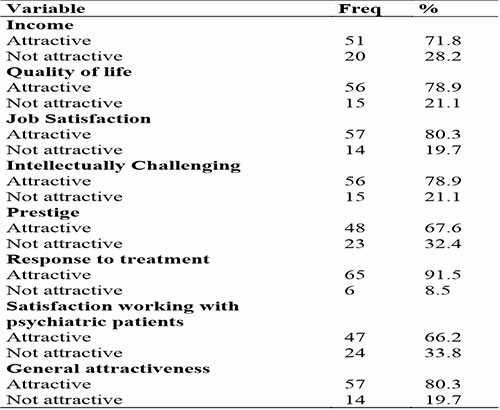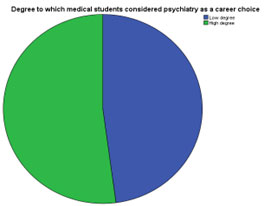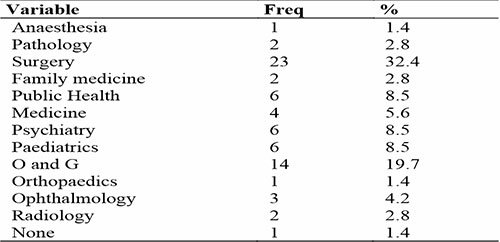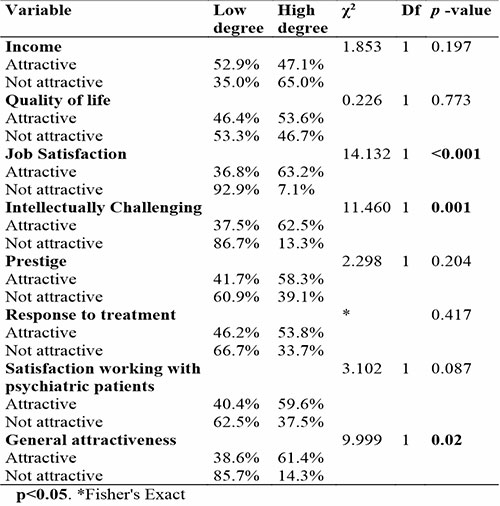Psychiatry as a career choice: determinants of attraction towards psychiatry among final year medical students in a Nigerian university
Bakare AT1, Yakubu AI2, Abubakar A2, Attahiru A2, Abdulsalam HS2, Ahmad M2, Eneojo IS2, Bello A2, Lawal HA2, Yunusa MA1
Abstract
Background: Despite an increase in the overall number of medical students, the shortage of psychiatry trainees in Nigeria and worldwide reflects diminishing interest in psychiatry among medical students. The study examined the degree and factors influencing attraction towards psychiatry as a career choice.
Method: A cross-sectional study of 71 final-year medical students who enrolled at the Usmanu Danfodiyo University Sokoto State (UDUS), Northwest Nigeria between 2006/07 and 2013/14 academic session were interviewed in 2021 while in 600 level. The questionnaires were adapted from similar studies.
Results: The ATP-30 revealed a high prevalence of negative attitudes towards psychiatry, the degree of preference for psychiatry as a career option was classified as low and high. Almost half (47.9%) of the participants had a low degree of preference for psychiatry as a career choice. Most (92.9%) of the participants rated job satisfaction (p<0.001) and intellectually challenging (86.7%) (p<0.001) poorly, as negative influences for not being attracted towards psychiatry as a career choice. A low proportion (8.5%) of the participants selected psychiatry as their most preferred area of specialization. Generally, the majority (85.7%) viewed psychiatry as not attractive. Among the participants, the majority perceived psychiatry as unattractive. Students' misconceptions about job satisfaction and the negative view of not being intellectually challenging were the associated factors for the negative views towards psychiatry.
Conclusion: There is a need for strategy and policy to promote interest in psychiatry early in medical school and residency programs as recommended by the World Psychiatric Association.
Keywords: Psychiatry, career choice, medical students, Nigeria
Introduction
Mental health is an essential component of overall well-being, and its significance in public health is undeniable.1 Mental health disorders pose a significant burden globally, affecting individuals, families, and communities.2 According to the World Health Organization (WHO), mental disorders constitute a substantial portion of the global disease burden, contributing to disability and decreased quality of life.3 Addressing mental health issues requires a well-equipped and adequately staffed mental health workforce, including psychiatrists, to provide effective care and support.
In Nigeria, as in many other countries, mental health services face numerous challenges, including a shortage of mental health professionals and the stigma associated with mental illnesses.4 The choice of a medical specialty by medical students significantly impacts the future healthcare workforce composition.5 A 20-country cross-sectional survey of final year medical students at 46 medical schools reported 19% of students were “quite likely” and 25% were “definitely not” considering psychiatry.6 During medical school, experience of psychiatric enrichment activities (special studies modules and university psychiatry clubs), experience of acutely unwell patients and perceived clinical responsibility were all associated with choice of psychiatry.6 A systematic review of 751 screened studies out of which fifty-four were included reported surgery and internal medicine as the most wanted specialties among medical students.7 A cross-sectional survey of 100 fifth year medical students of the University of Maiduguri, Nigeria conducted using the 30-item Attitudes to Psychiatry (ATP-30) Scale reported a low mean ATP- 30 score of 89.0.8
In a study conducted among one hundred and eighty-one medical students in the southwest, Nigeria to examined the impact of a psychiatry clinical rotation on medical students’ attitudes to psychiatry and possible career choice using a career choice questionnaire, the overall attitude of the students to psychiatry was favourable at the beginning of the rotation with significant improvement following the rotation (p=0.003). Students who indicated preference for specialties other than psychiatry showed a greater improvement in their attitude to psychiatry following the rotation (p= 0.011). The rotation however did not enhance students’ preference for psychiatry as a future career.9 Understanding the factors influencing medical students' attraction towards psychiatry as a career choice is critical for developing strategies to attract and retain psychiatrists in the Nigerian healthcare system.5 Despite an increase in the overall number of medical students, the shortage of psychiatry trainees in Nigeria and worldwide reflects diminishing interest in psychiatry among medical students.
This study assessed students’ attitudes towards psychiatry, examined the degree and factors influencing attraction towards psychiatry as a career choice among final year medical students in a Nigerian university. By assessing the level of interest and identifying the factors that influence their career choice, we aim to shed light on the potential challenges and opportunities in promoting psychiatry as a viable and attractive career path. The specific objectives are to assess the attitudes of the participants towards psychiatry, the degree and factors influencing attraction towards psychiatry as a career choice, the types and prevalence of preferred areas of specialization, the most preferred choice of specialization among the students and the association between factors influencing attractiveness to psychiatry and degree to which medical students considered psychiatry as a career choice.
Materials and methods
A cross-sectional study of 71 final-year medical students who enrolled at the Usmanu Danfodiyo University Sokoto State (UDUS), Northwest Nigeria between 2006/07 and 2013/14 academic session were interviewed in 2021 while in 600 level. The questionnaires were adapted from similar studies and included questions on demographics, attitudes towards psychiatry, degree to which medical students considered psychiatry as a career choice, factors influencing attraction towards psychiatry as a career choice, most preferred choice of specialization among the students. The degree to which medical students considered psychiatry as a career choice was measured on scale of 0 to 9, 9 represented “quite likely” and 0 “definitely not” considering psychiatry. A score of ≤ 4 was considered as low degree of considering psychiatry as a career choice, while a score of ≥ 5 was considered as having high degree of considering psychiatry as a career choice. The factors influencing attraction towards psychiatry as a career choice included income, quality of life, job satisfaction, intellectually challenging, prestige, response to treatment, satisfaction working with psychiatric patients. Attitudes to psychiatry were measured using the 30-item Attitudes to Psychiatry (ATP-30) Scale. This instrument has been used to assess the attitudes of students toward psychiatry in Nigeria (8, 9). The scale measures attitude using a 5-point Likert scale with questions about attitude to psychiatric patients, illness and treatment, psychiatrists, psychiatric institutions, teaching, knowledge, and career choice. It generates a global score between 30 and 150. A score of less than 90 is suggestive of negative attitude towards psychiatry. The questionnaire was piloted among 10 medical students who were not among the participants. All the items of the questionnaire were clearly understood during the pilot study. Ethical approval was obtained from the university ethical committee and all the participants signed the informed consent form. All the students in the class were included in the study.
Statistical methods: Statistical analyses were performed using SPSS v 23. Significance level was set at 5% (p < 0.05). Categorical variables were summarized by the number and percentage of subjects in each category. Continuous variables were summarized using the mean and standard deviation.
The primary analysis examined factors associated with the students reporting the degree of attractiveness to psychiatry as a career choice. This variable was originally measured on a scale of 0-9 (9 represented “quite likely” and 0 “definitely not”). For the purposes of analysis, this scale was reduced to a binary outcome, with students rating themselves from 0-4 as having low degree of attraction to psychiatry and those from 5-9 had high degree of attractiveness to psychiatry as a career choice. The association between categorical variables and this measure was assessed using the Chi-square test. Binary logistic regression was used to identify the determinants of high degree of attractive to psychiatry as a career choice.
Results
A total of 71 medical students consented to take part in the survey. Participants had a mean age of 26.42±2.24 years. The majority (70.4%) were male, 90.1% of students were Muslims, a few (5.6%) of the participants were married, 66.2% were from Hausa ethnic majority, 12.7% was absent from psychiatry, 23.9% had family history of mental illness, only 15.5% witnessed ECT during psychiatry posting (Table 1).
Table 1: Sociodemographic variables of the respondents
Attitudes towards Psychiatry
The participants had a mean ATP- 30 score of 83.0 (s.d = 2.4), which is suggestive of a negative attitude towards psychiatry.
Table 2: Factors influencing attraction towards psychiatry as a career choice
Degree of attractiveness to psychiatry as a career choice
On converting the scale into binary outcome 47.9% had low degree of attraction to psychiatry as a choice of specialization (Fig 1). The primary analysis examined the degree of participant’s attraction to specialize in psychiatry. Generally, 16.9% were definitely not considering specializing in psychiatry, while 5.8% of participants were “definitely” considering specializing in psychiatry.

Figure 1: Degree of attraction towards psychiatry as a career choice
Factors influencing attraction towards psychiatry as a career choice
Surprisingly, regarding factors that influence the degree of attraction towards psychiatry as a choice of specialization, higher proportion of the participants rated all the factors as attractive.
Prevalence and types of the most preferred areas of specialization
Majority, 32.4% of the participants selected surgery as the most preferred specialty, while 8.5% selected psychiatry (Table 3).
Table 3: Most preferred area of specialization
Participants' view on psychiatry as a career choice
Most, 85.9% of the participants did not consider psychiatry attractive as a career choice (Fig).
Association between factors influencing attractiveness to psychiatry and degree to which medical students considered psychiatry as a career choice
The analysis of association between factors influencing attractiveness to psychiatry and degree to which medical students considered psychiatry as a career choice revealed that those who reported no attraction to job satisfaction (<0.001), intellectually challenging (0.001) and generally not attractive (p=0.02) had lower degree of considering psychiatry as a career choice.
Table 4: Association of attractiveness to psychiatry and degree to which medical students considered psychiatry as a career choice
Discussion
To the best of our knowledge, in the institution where the survey was conducted, this study is the first of its kind that accessed medical students regarding their interest in psychiatry as a career choice. Furthermore, in the Northwest Nigeria, no adequate research evidence on this subject.
Overall, the attitude of the participants towards psychiatry was very disappointing. The mean ATP score was low, suggesting a negative attitude and view of psychiatry. In the UK, medical students consistently report low rates of interest in psychiatry as a career over time with negative perceptions of the specialty.10 This appalling status of attitude of medical graduates towards psychiatry has been frequently echoed by literature both recently as well as in the past.8,11,12
We found that only 5.8% of students surveyed were “definitely” considering specializing in psychiatry, which is slightly higher compared to previous studies.10 Overall, we also found that 47.9% had low degree of attraction to psychiatry as a choice of specialization. The percentage of students choosing psychiatry was identical across the medical schools.7
We looked at a number of factors that influence the degree of attraction towards psychiatry as a choice of specialization. Surprisingly, a high proportion of the participants rated all the factors as attractive. Given the very low number of students who indicated psychiatry as the most preferred area of specialization, it would appear that their positive responses to all the factors influencing their attraction to psychiatry as a career does not translate to the selection of psychiatry as the most preferred area of specialization because most students still reported that psychiatry is a not attractive as a career choice. This suggests that medical students, perhaps have an initial negative mindset towards psychiatry which may be difficult to change. The issue may need to be more explicitly addressed.
By comparing those students with low and high degree of attraction for psychiatry as a career choice, no attraction to job satisfaction, not intellectually challenging, and generally not attractive were significantly associated with lower degree of considering psychiatry as a career choice. The data confirmed that job satisfaction, intellectually challenging, and generally not attractive were highly important. Other factors are not high priorities for most students. This was also confirmed in previous research.10 All these studies reflect that the medical students’ poor attitude towards psychiatry as noticed in our study is congruent to many of the previous studies till date.
Conclusion and recommendations
Among the participants, the majority perceived psychiatry as unattractive. Students' misconceptions about job satisfaction and the negative view of not being intellectually challenging were the associated factors for the negative views towards psychiatry. There is a need for strategy and policy to promote interest in psychiatry early in medical school and residency programs as recommended by the World Psychiatric Association (WPA).
The study was conducted in one Nigerian university, which limits the extent to which the results can be generalized.
References
- Asztalos M, De Bourdeaudhuij I, Cardon G. The relationship between physical activity and mental health varies across activity intensity levels and dimensions of mental health among women and men. Public health nutrition. 2010;13(8):1207-14.
- Patel V, Saxena S, Lund C, Thornicroft G, Baingana F, Bolton P, et al. The Lancet Commission on global mental health and sustainable development. The lancet. 2018;392(10157):1553-98.
- World Health O. The World Health Report 2001: Mental health: new understanding, new hope. 2001.
- Onyemelukwe C. Stigma and mental health in Nigeria: Some suggestions for law reform. JL Pol'y & Globalization. 2016;55:63.
- Iruo LA. Perceived determinants of brain drain among mental health care professionals in specialist health care facilities in Benin City. 2021.
- Farooq K, Lydall GJ, Malik A, Ndetei DM, Group I, Bhugra DJBme. Why medical students choose psychiatry-a 20 country cross-sectional survey. 2014;14:1-13.
- Levaillant M, Levaillant L, Lerolle N, Vallet B, Hamel-Broza J-F. Factors influencing medical students’ choice of specialization: A gender based systematic review. EClinicalMedicine. 2020;28.
- Wakil M, Abdul I, Abdulmalik J, Salawu F, Ahidjo A. The attitude and future career interest in psychiatry of medical students from the University of Maiduguri, North-eastern Nigeria. BOMJ; 2010.
- Adebowale TO, Adelufosi AO, Ogunwale A, Abayomi O, Ojo TM. The impact of a psychiatry clinical rotation on the attitude of Nigerian medical students to psychiatry. African journal of psychiatry. 2012;15(3).
- Budd S, Kelley R, Day R, Variend H, Dogra N. Student attitudes to psychiatry and their clinical placements. Medical teacher. 2011;33(11):e586-e92.
- Velikić V. Attitudes towards psychiatry among medical students worldwide: a review. Psychiatria Danubina. 2021;33(suppl 10):18-24.
- Sakarya D, Camsari UM, Coskun BJIRoP. Motivations of medical students towards psychiatry: A perspective from Turkey. 2013;25(4):399-405.